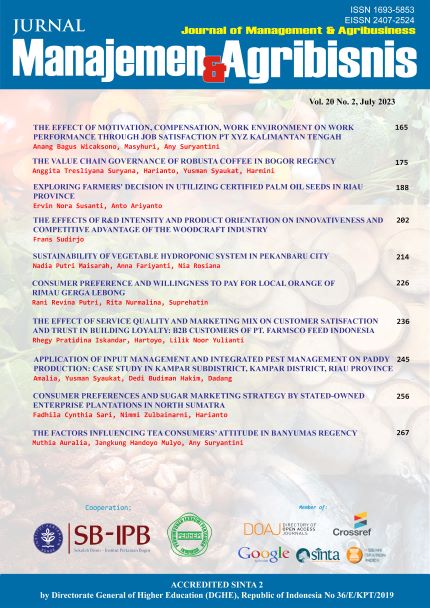The Impacts of Supply Chain Ambidexterity and Resource Flexibility on Supply Chain Resilience in Manufacturing SMES in Bandung, Indonesia
Abstract
The supply chain, which is an important part of business and production operations, can help manufacturing SMEs increase their competitiveness and strengthen their position in the market. The purpose of this study is to analyze the effect of extraordinary agility and resource flexibility on supply chain resilience. The research method used is a quantitative approach with the analysis technique Partial Least Square-Structural Equation Modeling (PLS-SEM). The number of samples used in this study was 194 respondents, chosen through a simple random sampling technique. The results show that resource flexibility has a positive effect on supply chain agility and streamlining. Supply chain agility also has a positive and significant impact on supply chain resilience, while lean supply chain cannot mediate this relationship. Finally, an agile supply chain also mediates the relationship between resource flexibility and supply chain resilience. The results of this study can be used as a reference for manufacturing SMEs in developing effective supply chain management strategies to increase their supply chain resilience.
Keywords: agile supply chain, lean supply chain, resource flexibility, supply chain ambidexterity, supply chain resilience
Authors
Authors who publish with this journal agree to the following terms:
- Authors retain copyright and grant the journal right of first publication with the work simultaneously licensed under a Creative Commons Attribution License that allows others to share the work with an acknowledgement of the work's authorship and initial publication in this journal.
- Authors are able to enter into separate, additional contractual arrangements for the non-exclusive distribution of the journal's published version of the work (e.g., post it to an institutional repository or publish it in a book), with an acknowledgement of its initial publication in this journal.
- Authors are permitted and encouraged to post their work online (e.g., in institutional repositories or on their website) prior to and during the submission process, as it can lead to productive exchanges, as well as earlier and greater citation of published work (See The Effect of Open Access).

